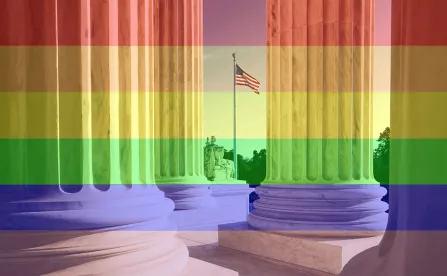SCOTUS: Title VII Protects LGBTQ and Transgender Employees. On June 15, 2020, the Supreme Court of the United States released its historical decision in Bostock v. Clayton County, Georgia, holding that discrimination against gay or transgender workers is discrimination “because . . . of sex” under Title VII of the Civil Rights Act of 1964. Writing for a 6-3 majority, Justice Gorsuch concluded:
Ours is a society of written laws. Judges are not free to overlook plain statutory commands on the strength of nothing more than suppositions about intentions or guesswork about expectations. In Title VII, Congress adopted broad language making it illegal for an employer to rely on an employee’s sex when deciding to fire that employee. We do not hesitate to recognize today a necessary consequence of that legislative choice: An employer who fires an individual merely for being gay or transgender defies the law.
While the decision represents an enormous moment in civil rights jurisprudence, it does not completely close the chapter on the push for LGBTQ equality in the United States. For example, the Buzz is taking note that the Equality Act is still pending in Congress and includes broader protections beyond the workplace.
SCOTUS: DACA Lives. In another groundbreaking ruling, on June 18, 2020, the Supreme Court of the United States issued its decision in Department of Homeland Security v. Regents of the University of California, ruling that the Department of Homeland Security’s (DHS) 2017 decision to rescind the Deferred Action on Childhood Arrivals (DACA) program was arbitrary and capricious under the Administrative Procedure Act. The Court determined that DHS had discretion on how to unwind the various elements of the DACA program, but DHS failed to adequately explain why it decided to end the program entirely and failed to take into account DACA recipients’ reliance interests. So, while the Court acknowledged the administration’s legal authority to rescind DACA, it ruled that the administration did so unlawfully because it did not follow proper procedures.
Administration Poised to Ban Certain Nonimmigrant Visas. The Buzz is closely monitoring the administration’s pending follow-up to its April 22 proclamation that suspends the entry of individuals seeking entry to the United States on an immigrant visa. Part of the proclamation requires the Department of Labor, Department of State, and Department of Homeland Security to “review nonimmigrant programs” and make further recommendations on ways to “stimulate the United States economy and ensure the prioritization, hiring, and employment of United States workers.” While the details of these recommendations are not publicly available, the administration is imminently expected to issue an executive order that would temporarily suspend the entry of various nonimmigrant workers into the United States, including H-1B, H-2B, L-1, and J-1 visa holders. In conjunction, it is expected that regulatory action will follow to limit the Optional Practical Training program, rescind the H-4 EAD rule, and place new restrictions on the H-1B program.
OSHA Issues Return-to-Work Guidance. On June 18, 2020, the Occupational Safety and Health Administration issued guidance for returning employees to work at non-essential businesses. The guidance “focuses on the need for employers to develop and implement strategies for basic hygiene (e.g., hand hygiene, cleaning and disinfection), social distancing, identification and isolation of sick employees, workplace controls and flexibilities, and employee training.”
EEOC Updates COVID-19 Testing. On June 17, 2020, the Equal Employment Opportunity Commission (EEOC) updated its guidance, “What You Should Know About COVID-19 and the ADA, the Rehabilitation Act, and Other EEO Laws,” to address, in part, the issue of COVID-19 antibody testing in the workplace. According to the guidance, antibody tests do “not meet the ‘job related and consistent with business necessity’ standard for medical examinations or inquiries for current employees” under the Americans with Disabilities Act. These tests differ from viral tests administered to determine whether an employee has an active case of COVID-19, which the EEOC has stated is permissible.
Juneteenth. June 19, 2020, is the 155th anniversary of Juneteenth, which commemorates the day in 1865 on which union army general Gordon Granger announced in Galveston, Texas, federal orders proclaiming all slaves in Texas free. Although President Lincoln’s Emancipation Proclamation became effective more than two years prior, on January 1, 1863, enforcement was challenging in Texas due to a lack of union soldiers. Moreover, the Emancipation Proclamation only applied to states that were in rebellion against the union, so neither it, nor Juneteenth, ended slavery in the United States. Slavery was still permitted in border states like Maryland, Delaware, Kentucky, and Missouri. Of course, it was not until the ratification of the 13th Amendment, approximately six months later in December of 1865, that slavery was completely abolished in the United States.
In 1980, Texas became the first state to recognize Juneteenth as a holiday (the bill’s champion, state Representative Al Edwards, passed away on April 29, 2020). Today, 46 states and the District of Columbia recognize Juneteenth as a ceremonial or state holiday, and more states are moving towards formal recognition of the holiday. In Congress, legislators from both parties and in both the Senate and House have introduced bills to recognize Juneteenth as a federal holiday. Maybe recognizing the significance of this historical day will be one thing on which our quarrelsome elected officials can agree.




 />i
/>i
